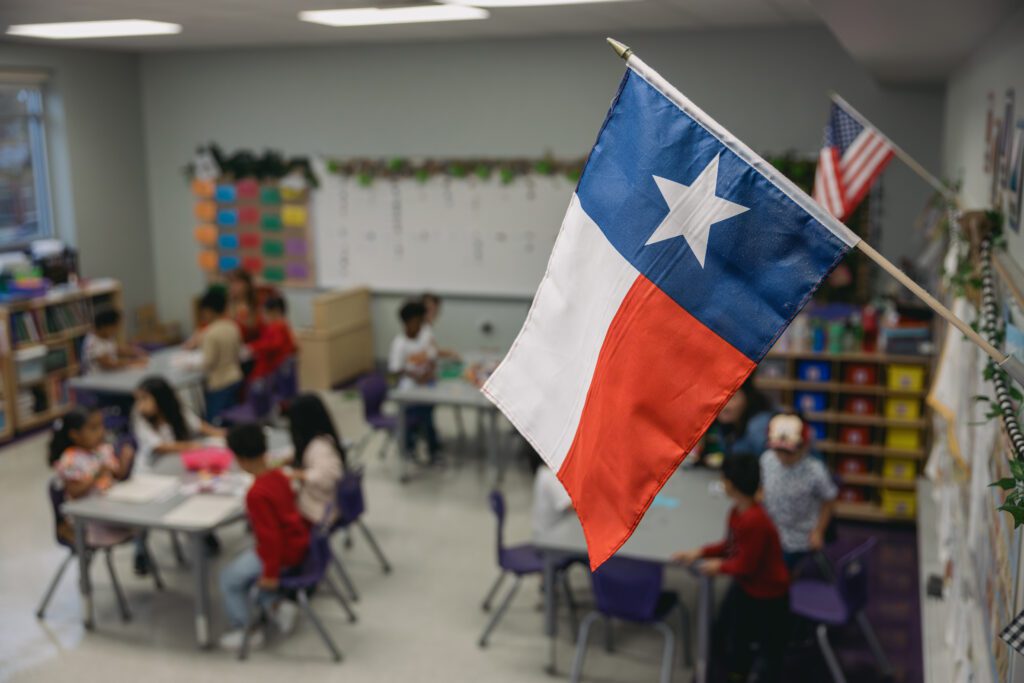
categories
The Ripple Effect of Increasing the Basic Allotment in Texas

May 19, 2025
The Power of the Basic Allotment for Texas Schools

The public education system in Texas is one of the largest in the nation, with more than 1,200 school districts and public charter schools and just under 9,000 school campuses. Our schools employ more than 776,000 people—approximately half of whom are teachers—to educate 5.5 million Texas students.
And yet, while we are among the largest and most diverse collection of public schools in the country, we are also one of the lowest funded. Texas ranks in the bottom 10 nationwide for per-student funding, around $4,000 under the national average.
In addition to lacking overall investments in students and schools, Texas has a few structural challenges with our school funding system, including the way state tax revenues support our schools and the amount set by the Legislature for the basic allotment, the building block Texas uses to fund students and schools, pay for teachers, and operate all aspects of what takes place within a campus or school district.
During the week of May 12, 2025, members of the Senate Committee on Education K-16 heard the Senate Committee substitute for HB 2 (CSHB 2), the 225-page teacher pay and school funding bill. The bill provides $8 billion in new funding for teacher pay, special education allotments, early education math and literacy programs, school safety, and small- and mid-sized adjustments.
The Senate’s version of the bill also provides a $55 increase to the basic allotment, which is in contrast to the $395 increase to the basic allotment in the House’s version of the bill. Right now, the House and Senate are locked in negotiations over the basic allotment, one of the components in CSHB 2.
Texas school leaders are speaking out, saying the current “funding deal” leaves out support staff. Lockhart ISD Superintendent Mark Estrada says, “At first glance, this legislation appears to promise historic investments in public education, but I need to be direct with you, the version currently being considered by the Senate…is harmful to Lockhart ISD.”
Superintendent Estrada goes on to say that if Lockhart ISD receives only a slashed $55 basic allotment, it will be offset entirely by another area of the funding formula, with a net impact of ZERO for Lockhart ISD students. This legislation could divide and destabilize their teams, who serve students every day. Only 41% of their staff would receive a proposed raise, leaving out so many. And the teachers who would receive the raise aren’t asking for one at the expense of their colleagues.
Dr. Bobby Ott, superintendent of Temple ISD, shares his analysis of HB 2 – the Senate version – and notes that $8 billion is a historic amount of money that focuses on teachers and special education, but the bill warrants some attention. He gives examples of the shortfalls involved with the $55 increase in the basic allotment, and says, “…given our (state’s financial) surplus and that ESAs have passed, why not fund the other 80% of students who don’t qualify for special education or the 48% of the staff who are not teachers.” He goes on to say, CSHB 2 also excludes teacher pay for first- and second-year teachers, and that everyone matters.
One point he makes is an especially important one: if this bill passes with the basic allotment at $55 – as currently written – then the Temple ISD’s financial commitment to Teacher Retirement System payments for the new teacher raises will result in about only $45,000 left over in new money to take care of:
- Raises for 1st and 2nd year teachers;
- Rising costs of general education services due to inflation; and,
- Producing a compensation increase for non-teachers in Temple ISD.
The basic allotment does a lot for our school districts, including solving three main challenges in particular and adding one big benefit. Three main challenges — funding teacher pay raises, addressing rising inflation, and reducing recapture—can all be addressed by one school funding solution. The solution is raising the basic allotment.
And when you raise the basic allotment, you also give school districts the flexibility to spend the money received as needed, especially for things like building repairs, transportation, food service, counseling, wage increases, and more.
By increasing the foundational per-student funding element known as the basic allotment (BA), the Texas Legislature can also address three other challenges that are holding our schools back.
School Funding Challenge #1: Funding Teacher Pay Raises
The teacher workforce crisis has been well documented. For the past three years, over three-fourths of Texas teachers have seriously considered leaving the profession, marking the highest levels of teacher dissatisfaction in decades. And 77% of Texas teachers feel they are not paid a living wage.
The Basic Allotment Solution: Current state law requires 30% of any increase to the basic allotment must be used to increase educator pay. Increasing the basic allotment would give all school districts and charter schools additional funding to boost teacher salaries.
School Funding Challenge #2: Addressing Inflation
The passage of House Bill 3 (2019) was the last time schools received additional funding, but that funding advantage has completely eroded. Today, continued rises in inflation and a lack of school funding from the 88th Legislative Session have led school districts to struggle financially. Many schools across the state are reporting financial crises due to inflation and the rising cost of living in communities across Texas.
The Basic Allotment Solution: By increasing the basic allotment, all public school districts and public charter schools would receive increased funding to offset higher costs. Even better than a simple increase would be if the state commits to a permanent inflationary adjustment, so school districts and the legislature don’t have to revisit the issue every legislative session.
School Funding Challenge #3: Reducing Recapture

The state’s system of recapture (sometimes referred to as Robin Hood) attempts to balance out the vastly different amounts of revenue school districts collect from local property taxes. The state employs a set of funding formulas using local taxes and state aid to determine how much total revenue a school district is allowed. In some instances, local taxes alone exceed the entitlement amount, and the state is allowed to recapture any excess revenue from local taxes.
Because property values in Texas continue to rise in many regions, districts are sending historically high amounts of funding back to the state in recapture payments, and the state is contributing less to the overall funding pool.
The Basic Allotment Solution: When the state contributes more to education funding through the basic allotment, the amount of recapture funding the state collects goes down. This is because raising the basic allotment also raises the entitlement owed to a school district, helping to reduce recapture.
Dr. Chris Allen from Midway ISD shares, “While lawmakers claim ‘historic funding,’ the actual increase to schools is just $55 per student—barely 1%, after 5 years of flat funding and 23% inflation. That won’t keep programs alive. It won’t stop staff cuts. It won’t sustain the EXCELLENCE Midway ISD is known for.”
Brenda Sanford, superintendent of Red Oak ISD, echoes messages heard from her peers throughout the state. “Fifty-five dollars does not even come close to covering the increased cost of running a school district.”
The Texas Legislature must act and look to raise the basic allotment during the 89th Legislative Session. The “basic allotment solution” will truly support school districts with the most flexible funding so they can support teachers and students. In turn, the success of our students will build the future of our economy and communities.
What will happen next?
The Senate Committee Substitute for House Bill 2 (CSHB 2) still needs to advance to the full Senate to be approved and then move back over to the full House, where the members can either accept the Senate version or request a conference committee. May 28, 2025, marks the last day on which the Senate can vote out CSHB 2, and May 31, 2025, marks the last day the House and Senate can reach an agreement in conference committee.
| Basic Allotment Basics |
- The basic allotment (BA) is the amount of funding each school district or charter school receives for each student who attends.
- The BA is the baseline multiplier for many special funding allotments, such as Special Education, Career & Technology (CTE), Bilingual Education, and Gifted & Talented (G/T). When the BA is increased, the funding for each special program is also increased.
- The BA funding amount is set in state law. Currently, the basic allotment is $6,160 per student.
- The BA is not derived from the actual cost of educating a student.
- The higher the BA, the less districts will owe in recapture payments (also known as Robin Hood).



